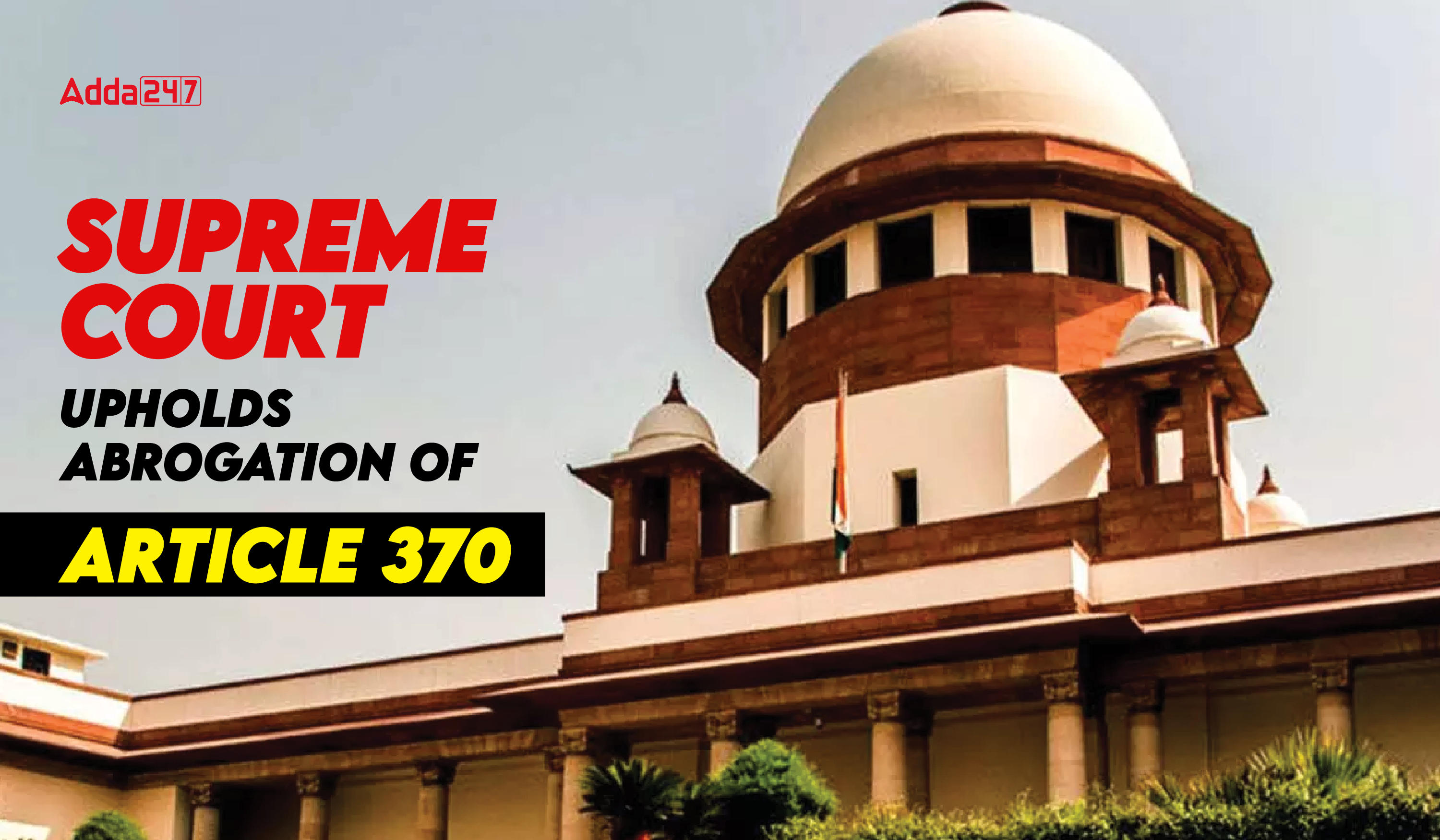Table of Contents
The Supreme Court of India recently dismissed petitions seeking a review of its decision to uphold the abrogation of Jammu and Kashmir’s special status under Article 370 of the Constitution. A five-judge bench, including Chief Justice of India D.Y. Chandrachud and Justices Sanjiv Khanna, B.R. Gavai, Surya Kant, and A.S. Bopanna, reviewed the petitions in chambers and found no apparent error in the original judgment delivered on December 11, 2023.
Historical Judgment on Article 370
On December 11, 2023, the Supreme Court delivered a historic judgment that upheld the abrogation of Articles 370 and 35A. The Court affirmed the Union Government’s decision on August 5, 2019, to revoke Article 370, which ended the special status of Jammu and Kashmir. The Court observed that this move was aimed at enhancing constitutional integration, not disintegration, and recognized that Article 370 was never meant to be permanent.
Understanding Article 370
- Article 370 provided special status to Jammu and Kashmir, allowing it to have its Constitution, Flag, and autonomy over most matters except defense, foreign affairs, and communications.
- This provision was introduced in 1949 as a temporary measure, based on the terms of the Instrument of Accession signed by Maharaja Hari Singh in 1947, when the region joined India following an invasion by Pakistan.
Process of Repealing Article 370
The abrogation of Article 370 involved several steps:
- Presidential Orders: In 2019, Presidential orders redefined the term “Constituent Assembly of Jammu and Kashmir” to mean “Legislative Assembly of Jammu and Kashmir,” and used the powers of the Legislative Assembly (under the President’s rule) to revoke Article 370.
- Parliamentary Resolutions: Concurrent resolutions passed by both houses of Parliament on August 5 and 6, 2019, revoked the remaining provisions of Article 370.
- Jammu and Kashmir Re-organisation Act: This Act bifurcated the State into two Union Territories—Jammu and Kashmir, and Ladakh.
Also Read: New Criminal Laws in India 2024
SC’s Observations on Article 370
- The Supreme Court held that Article 370 was a temporary provision meant to facilitate the transitional integration of Jammu and Kashmir into India.
- The Court ruled that the State of J&K had no internal Sovereignty, and the President’s power under Article 370(3) to declare it inoperative did not require the concurrence of the State Government.
- The Court also upheld the Jammu and Kashmir Re-organisation Act, 2019, which bifurcated the State.
Court’s Reasoning on Article 370
The Court’s judgment emphasized several points:
- Temporary Nature of Article 370: The Court stated that Article 370 was always intended to be temporary, serving as a transitional provision to integrate J&K into India.
- Governor’s Role: The Court upheld the governor’s power to assume roles of the state legislature under the President’s rule, referencing the landmark 1994 ruling in S.R. Bommai v. Union of India.
- No Need for State Government Concurrence: The President could unilaterally declare Article 370 inoperative without state government concurrence.
- Validity of Re-organisation Act: The Act’s provisions for creating the Union Territory of Ladakh were upheld, while the restoration of J&K’s statehood was emphasized as a future goal.
Abrogation of Article 370: Impacts
The abrogation of Article 370 had significant impacts, including constitutional changes that removed Jammu and Kashmir’s special status, integrating it fully into India, leading to changes in governance, legal framework, and socio-political dynamics in the region.
- Since the abrogation of Article 370, there has been a significant decline in violence in Jammu and Kashmir, with decreased terrorist incidents and increased security measures.
- Economic development has accelerated, with initiatives like the Prime Minister’s Development Package and the Industrial Development Scheme boosting investment and job creation.
- Infrastructure development has improved connectivity, and tourism has surged, with record numbers of visitors.
Conclusion
The Supreme Court’s judgment reinforces the principles of Unity and good governance, aligning with the vision of ‘Ek Bharat, Shreshtha Bharat.’ By upholding the abrogation of Article 370, the Court has affirmed the sovereignty and integrity of India, paving the way for a more integrated and developed Jammu and Kashmir.
The Court has directed the Election Commission to conduct elections in J&K by September 30, 2024, and emphasized the restoration of statehood as soon as possible. This landmark decision underscores the importance of National Unity and the collective commitment to India’s Constitutional framework.
| Related Articles | |
| Animal Rights in India | Cruelty in Marriage |
| Rights to Speedy Trail | |
| Custodial Death in India | Personality Rights |



 TSPSC Group 1 Question Paper 2024, Downl...
TSPSC Group 1 Question Paper 2024, Downl...
 TSPSC Group 1 Answer key 2024 Out, Downl...
TSPSC Group 1 Answer key 2024 Out, Downl...
 UPSC Prelims 2024 Question Paper, Downlo...
UPSC Prelims 2024 Question Paper, Downlo...




